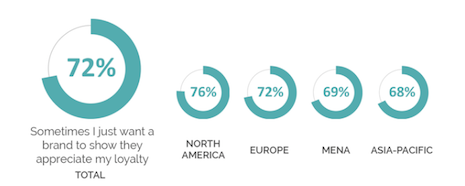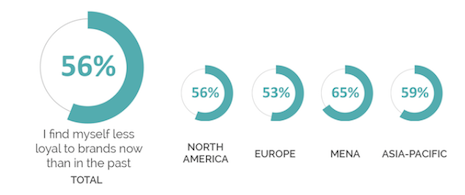Affluent consumers today are less likely than ever to feel like they personally relate to a brand, which for many is a major factor in whether they are willing to spend on that brand at all.
According to YouGov’s new Affluent Perspective Global Study, 72 percent of affluent consumers worldwide said that they felt there were very few brands that they could personally relate to, with the Middle East being the region where this feeling is the strongest. To fix this, luxury brands need to deepen their understanding of the values and desires of their customers and learn how to approach them in a way that feels both appealing and authentic.
Retaining loyalty
For any consumer, relating to the brand is an important part of making purchasing decisions. For luxury consumers, this is even more important as they have more ability to express themselves through what they consume.
According to YouGov, 62 percent of affluent consumers worldwide find that relating to a brand on a personal level is a very important factor in their brand loyalty.
Despite that importance, the majority of luxury brands are doing a poor job of making consumers feel like they relate.

Customers want brands to show appreciation. Image credit: YouGov
This has had an effect on loyalty for brands. Fifty-six percent of affluent consumers said they are less loyal to brands now than they were in the past and 72 percent said they wished the brands they shopped at would show that they appreciate the loyalty that they give.
The feeling of relation and reciprocation is especially important for consumers in the Middle East. Seventy-seven percent of affluent consumers in that region said that relating to a brand is a major factor in their loyalty and 80 percent said that they do not relate to many brands.
These figures for Middle Eastern affluent consumers are far higher than consumers in other regions and shows how much work brands, especially Western brands, have to do in order to regain some of that loyalty.
Moving forward
YouGov has a few suggestions for navigating the problem of low loyalty thanks to lack of relation.
For one, brands need to understand their customers on a deeper level. For this, data analytics can be incredibly helpful as it allows brands to get a better picture of who their customers are.
That data will be useless however, unless brands can act on it intelligently.
This is especially true for the Middle East, where the majority of customers find the hardest time relating to brands. This will become increasingly important as the Middle East matures as a luxury market.
The rising sophistication of Chinese travelers has resulted in a retail and tourism boom in the Middle East and North Africa, as visitors seek new destinations off the beaten path.

Loyalty is plummeting. Image credit: YouGov
According to a new report by The Luxury Conversation, and commissioned by Reuters Communications, the Middle East and North Africa (MENA) region is no longer lagging in popularity among Chinese tourists. Most often, tourism from China is linked to Europe and North America, but increasingly, due primarily to visa policies, infrastructure and experiential trends, Chinese tourists are booking trips to MENA, opening opportunities for luxury brands and hospitality (see story).
But even outside the Middle East, the number of affluent consumers who feel underserved by brands is alarmingly high. Brands around the world need to come up with compelling reasons why they relate to their customers on the issues that are important to them if they want to retain their loyalty.
{"ct":"Y9k\/nSYex5JoZqqtbj6FELz69u25sS9DQpi+p57Afy6RGnq1H4qsPGmB\/BSZt8t9r33J2esXifP3gVJu0Ryrv2qhOM5LMfZyQwSART97rYvrO\/AbUCgxrSBhKTpICDCtv4xi3YGY+xWy9Fmx0XRlODHvfREwvV2SS8V2SfgR5uOdp73lg+bZAlUxvNhnJ0PyzCTFlawBuPpkBq13LDOTAwHEHwjQ4CZbuHKe8lk0YDhDyVe1FhTl3\/yOu+Nnhy2rRI5sd3K98FyCcngJpjZ67Rgo3o6wpqTlvjOK5f7vLTH8YkeREW9pPZ1WAwNay+ufizJiWxH0ZassAx180aAbJT+HrC8RZlDhkawxcEZRcATTsdc6m5y7xAsWraOeIJwobR73x72XLRsHhK3gswoFb6u5ci6vzTBsAyde4s405oSr03ACSoKBlPfLClTTi9\/jbfD3yiupcayDWXQ2Jxu0fonA2gz+yI4Mc0SePYxNnyrNxmUX12Jn9OlKIwZ4Hc7K+gOGAUEBI4Aj+IOcNpI9vw7\/h2ICpVXDQ4bybTOJpTzdvs7J6eQivIAfoxavmaEMGoEyfIsJur\/rKwuAu\/vrujo9CU0vJUSWBY551xAqkaSkRYQ7mcHgbPhs\/DDR68IW27Yg5negm3mcKY2f8wwt5fWL4xyvij4bq5SZ5N1gTAk0kAOz8\/l1vg+7qCYWlGjuHzKbaW8kf32jnTa3tYZWNqXQtIQu61VJLM6HjStePWE8lDrXktt4Ld24hx4T56dPbfxT4+AjfjPQytZMk7vzEk8VFRnAVkWdHD\/02kt\/Qs2lwaOdTLsAcYEfg2JIk4YsJDV2nCeH2eL2APYkUOXYQ914PiXpmq9BJ63+1JEzyHlNkn5U77INiW9cNZra6YMQsTCJU5wFMcHcQo7cPlq8K2tMKjzxoDFaJ8JyVh63AQ\/csCorEhiA4\/BPTEMV35JhfPz0Y7vUTLvS2aIMOOhXS8kItFS0xLzF9aS90cHDDozjdYX4DDNEhpmw1XXwpvN3CprMDrsniDfZ2uYKGUut54hhSWJgzdRFhMpHnyj\/h0UAgGq34T3ZVStx7G3MnR8yWT6zJgDuFleGoiZ9tvrPDERV5\/MjDI5xNWvVfM\/N2huHX+LIeA2oPhc3QAlqoRtSRK5MUtMLW2n8BCvMVIvBbKebMORkyD4DMTJjhDd+uo7JWrgw8aQD2wBxD4KZbKCY\/lzVkCEtQ4iycDpQ\/MfhHcXz1QBoWzZ9pW4RgLc88rm9p4SO3D9jlYtaR1ZqIGZPCTOka3gn7A3vZ\/zL6\/duD3OjKC9\/usOVTsVJLNs67j3YVzVzB2FPTZheHNZXSgc3Ls2UXvNup8FRQnvC99HADCvfArR22IxmumQwAcZ5SR5Hp34ph1MTK\/GwAyS+6UBptohRLCU5UPPJuuPxbOMlLu7vTthYEXtGnP5t7aAKvvRDhO8jVLrzl+VhKfd3V9S44cZwZJ+Np6wXL5eO15qGvlpo2ZzRVj5HKHH+nBWWUsj\/xZS+SjlPYLEVUdRvThRa8lyTX0B2OBaRQKBhzEgEQ1\/qDaK3dhZurzdryiYTrqRy3FpK76ZegShkYo\/\/VNuSuphfW4aUDR7V5GfOBdDwKKeaveKaE1we7nwLn5tJChQL6PhmEz7v54OEkEIbnezgO\/LZm33h5ssvk2QcBB0kC0OA99VvbA5N1I9gw\/EcZoQg63nyVuD9xKk71GQxxeGteKO0NE08MQZXbh3j7BJzYyd\/xjBsvPjus7W\/Wd12+sC8oIm8nkioBiK\/BaqeILdAS1GKFzN5UsbCY0P+TofgNW0RhYuxNFFkySeVncpodsCUErl7LPpW+qg5RY2bDsv7LFgklPytBUJphsxFto33XYf1CLM6kVnCpTvQduGMVN3zpyd8YMMWPFXJMk7zbW\/O6izDxDs7Tmnl6Tgooua3EFJ4GU1othlbkGubpo8bPLcFtdl\/taT1gW4CqwZYL3kplsK5gq+8jZIME0gzplb4mZSQZnwknP\/ts18cEexTOfP5GoMpKRd18Z3asL2o8w1vQctGRIvkzHPHVnf00vH7SJQaZiMC29f3b5mmfkkxmp+D3an4X4vHa83mro5Nh4asaYA\/c0Sv4LjZ3IDSNpjEpsN4zDx23CWpKfgln2j5+AcpWe42hOCZUGIhvaryAet6AtIyvTYdwrVw5s9NErdgmPVsHSJH5581yUaPcTTjQ9qs\/YhAtRarfbDPOeUniEOS+gusj\/BDVsQJppGmfwkqksnptUBKVCbRJheMEeRDpehEfUeaubJPGzrTLsjeQb\/k1\/olnVltK0\/FMHJOgyrTBWLKCJANCvQsLRvN8sqR3acOOzlKT3rSTL5juRzPfdktnCXOMo5Rdmyg4Q0bSpy\/SBipiNNGFDQvTtFabzEvR77r2c35x+NBvt9m+gcDorAJBHofYJcgOJeWtYwSqM669qy510iyqH5JJk6+RCDHFi4B1OJVbUNzXGt5sqf2wlfVDJAhz0Zn6WbM2PPD2uZwUsWTHH4ygexon6leYn9S1PGnhjzUsH91aquXjZaaZSCQcw10EJr0FWDc9zZ1s0EQX6U4KU557A1bjTeb0z82VNzYVQZk1cGbCqx6\/+youwU\/M9l3jUk9Hjo7HLFDb\/fKq4dY2hHoHnI1KmOEnvQ8vvwsj1p8uPzM9eM1c1xDhRH1CgjI+7Ck8hkaFmIMwKeZaa\/SpF7BN8l8KqKYjG9PT+8nOjgIXf6cdQCG7AKcNTZQ3QLSKNYN5noatd49MwARcuapxBUkE3vWXiZZgx7KWG9YuM5Xa9RBxSXnWq8nZBL3M5BRsVUsGpHnkCs10BLovMqVSZW1wurdRSGigqIYAjjzQrZuCyGPwN6y9oHpC5\/DXROvu+Y3iyLNyM2CywQtiGvzbmJFHck4yWDst9iINthTspxcVh7NrHFzox9eIZEcnbcAyYS0S\/npp+kcBu6ls5983JAskkfuGJ56F18Am6Q3u6xSDYCW3bU\/BO9eK4x\/juSMmX3DfCMZ4+UpHxnKwNYzqCXr0a86VoTG2xjPZhKiIVqdT6In\/g384dXZlRzru8He9A3CmfEMjKe0gr0f3cKnatOScOuSRuEApr+O49A\/3p2N0GVW18tA500SR8Fo73G\/qmjg32CecFo\/vsnTSfZZBxU4VOXD5AHE+CLW58pTJmBSEE5vWV6O4Fudvk+pO\/rJ650mASczf\/FFspS7zSXhUVk+XaaZdGlNTZZue056YtnR+7vz3aaxlu\/M7\/tARpII+VvkyrEIoJRvnSZ6c1970VBCJxAAElc7aoPfReqy9Aa3nPW5u3I2y5mrLwcTT69du07WnGlz0RAgYYQmtr9OwAsqsiWVUe43xWdu6iROCsEzrzslbFdGdskl9TrJ0t56xCyTFHMFS8V692SlvXYOOe5jg54L8OFpx9Hidb8MmE20sQiwr5MVo3mA\/ZzirC4j7ZqnCAyLMDuCr2iup9WlvwMw6hsNkEravFoEPhPQ+IsyK4TluClu7R+jB6WCrTwhiCI8ngaWf9Xr24dNH0HyMwmxVWmldRJyHZYfmvYHn5DKiEcC4o7+JL6wlJn\/J8mUT5w6yMbpvdgchlr3AoJRZGOosbkLsLqospm7dzHIcWFYXtFGIwggHqXXS6J0icHXDzJT+Pv+f7r7UW59wldhr2vzcRBcVihQV+dH4eLo+LMK23B4EqxmVYGX+0zMMehfzmeyJE1EFHYYIcG8D3hNdshpuIG8MQ2EbdsX5OvScfapiQh5Cu+Ym4uDjJaREolsyZx7ErZjCn5A2h1GOlFE\/nyRiedtA\/4PLTi9Igi4GIH3zZBRSXqnE4teqUVGnPp1IU2VoqWu1P+xkDLXqcBLLGODQwO4sqHHMVlvTVPc5W1e25RPEZfYgnl9XdNUBlMYE3jfqPmXQcjcAQWaH4VEjHablC2BpawpoZabzdq4ZQQwVfzb27ZNNE61nmacCdsp36yeXhpDBosp39ZoO51Uzt+zLBoivgkAHeenaf\/puns5W3dB1VolgY9JifqyBY1SJDLvhL7C73sBDz7o9ZfqS7XGGwttJY1Z+pfrw3y2oU8VQAj7LcUrhUtaUbCSaYVc2P\/300zUCFl4cWL\/Oc4AGZmjcOYUAJnKAMaeyMdQI6V65RrgnKLUtsahBWSEGZ0SXBhRemanlGCxcbIRSQ\/zBML\/W5o0SzXKtGgx6dFlFZ2\/sGorciFoOohv38zcZplWE5vWNTgSta6Eb6kupV6vxtfuq\/fX5KNSEnu4PZ532QJpHXy6SoLUPoAfeI1wHTk7V6DrLpG62kmqFpAorv2ACsMOvaCYwlH1To3XiLknrC2Sy3YkgHHoyzwpcg4NObo1E+nDRlh3veWmdad2Av00emTcgHJY7TEZDcxM27K\/kCKrP8TDd9hI3wpihxYe3d0lOJhpBFtWiclLSdQ9ikAJ3+C2j+6U68CE60Mbe9WHO5Iv1OU8dPNPQFbqt6Yskvza+oiOqWLXCqyIObGkBnMQYg5kUVCOmyeiSHYJz2DW8aya0z5OP6dr+i5Bu68quGwT8VHmO70KjeoBwLzLdzplAdY6hIUxS1R6Gl2sJYoYSD\/MAwlYSrUScLSGgJ4RVLknGEiTv6wTae4DKei++dsIp+9i4n3jenGZbZ8wHyGTsRsixJ9AGEXRxU0nvwxR1ACCJ27Mm3cminoRj4CjLoN0nnRBnkgS+IO2iwEiQ2XyAd6QuhmmFzu5VpRYP\/T8nIbQXkPdAQ1fp4wH1LB33awMJSnuII8CF0Y5wJkiMOkWE7RZtKPk6OXy670O48ojCDM+5uvyXigYIHG7+OcOvcpGNlCmQd+OI7Gh7XDWAeUvP6AfwPLglLymVqulwkah21y15TjTvdVU6HjC9H31uO7NO0zL96xVC1jGmcNl3xJBo6nhjk1ROqsjz+c0Lv2FNDDxvj\/qr7YWpW8gdAZ\/cZyYg8s57s2mPkIt+752QEC21dHl8Ljb5KmxbfjxA\/d\/oaeCsSoINsJ15ztx8e8Hqc9P4eYcT4W0GK5qHBGpASOb4nQQepdbhFYtE8ViAFY9vAAcu\/BeMYH+TSANz1C2HVYjpZTtXvrn6ulhahXKL90Hvb85ebrGGWG84+SNZmn6c\/K1CC66wcLC\/5eZdO3Ndcw0RP2wlak2NkvXznPcxTaNmpygaS\/8cZQMRrhMM8a3SXVxNiKvHwMOydx+Rzqu6Yc\/i4JB\/XN33GjYt2EjIcwBS8\/67S\/xKAbOMekIXoTdJkDg+8sCrTNvQwEz0f6jJ2uZUp+vY5gOgf4\/wm957rzfRRNfRdPENAZ7h7fzL7RCqr1GnT+rl8WTsloVfG9B\/5pnl0MamRCL9AfeO+OudKApF71omFq52t65WCYPDPM5J7YzFUExRGuFbdore4HSqDMe5r5Akw6iE6vxJX4ri2tX+KzDlwSUepnJvT0p4l3gIvYBjwVckhGr4kwnL9jx0E\/6CevpMIJ+TxqQanFpklIaN26jlxLvEMnzKUz2fR0hdpiqvvVC\/0ioFDYh+fGLsOqJmgTpY3ol9T20r+C1YMCb6Sm0T6URTjR9OiI9XUDq2n3zpCsL6UxU+B8BpwQvsEpDRzuqOhundV4WR4Oy8ZuXVNr1E7wv\/RnBl9YIEWH7dv\/btVckwGhoJwXdH1lpSOAbivRk8oR6kG\/qEGl3hf\/eOIQPOw15NEenXerfWgSlKTwqpNU7vxDlyFZmJP4c3tyTNteVvFK7A+\/dT2929sjwftKbWZLlNjGUmuufdxuT5HwGcDwARWvCc7N508AE1nYyiFJWoVa7sBJmrwWOL61gfbL+eUTg8l15fztcjlzdBifiHIKGgFpjqr5lHWvz4nFqWGbx5jWFyJXQVOYDXD9yW+NtYptMotPyIfmtrDPHaX24rFIMdnvQJ5f+QXtca9GBlxlD82++Pv7tMkSypArQkOP2wRS5eQFplO995byCk5FLaSoxFA2t0T+raVFnoDUy3BYYENFKt6A7kbREmFU5\/ydxuanmMHAtU1mpHtK8EFq+HDWXJb8OdGZNNABocvAGpCBBZPapVLVnwtbf89aLnBK1aRuC4eze0YMSoBK\/xYJInL6voTX+ccxfQW3fFJtVfnzOywUPYUTf9\/hWY9xbMgKUdkfxor6MO6gI62NTs0jjh\/LcZh21J3Z6Ufcnz3e2vaEF9SUZac7ErYDysAO5pY8TY9dzlkYTGNdoScNZtYLg\/LE57R5idAyp0wMPgApd0z62o10BVr7Nu+IkgNSLrc8Q58KMlAfqroJahG3r858p8ojjEFX7v3kuwSaf+QXL4LfXqbArqoqVvz6D1lyjpsQVT08o5PoWPjtUCvHr","iv":"45eafd84621ea741e5c766ad56df39cc","s":"a7165bd07ec32609"}

 Many consumers feel that brands are doing a poor job of relating to them personally. Image credit: YouGov
Many consumers feel that brands are doing a poor job of relating to them personally. Image credit: YouGov